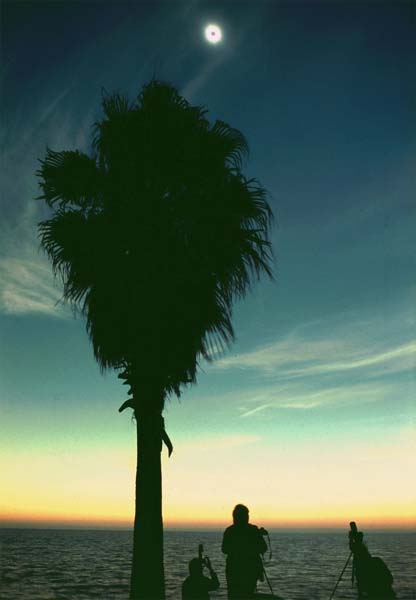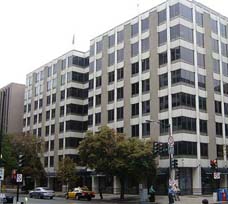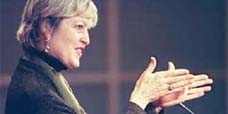2006.08.03: August 3, 2006: Headlines: COS - Togo: COS - Libya: Journalism: Solar Eclipse: Astronomy: PBS: Togo RPCV Marco Werman reports on a solar eclipse in Libya: a country seeking acceptance
Peace Corps Online:
Directory:
Libya:
Peace Corps Libya :
Peace Corps Libya: Newest Stories:
2006.08.03: August 3, 2006: Headlines: COS - Togo: COS - Libya: Journalism: Solar Eclipse: Astronomy: PBS: Togo RPCV Marco Werman reports on a solar eclipse in Libya: a country seeking acceptance
Togo RPCV Marco Werman reports on a solar eclipse in Libya: a country seeking acceptance

Those 10,000 eclipse chasers who arrived in the country with Werman have already set up camp on the desert plateau, pitching their tents and assembling their astronomical gear. The scene puts you in mind of the annual Burning Man Festival in the Nevada desert or perhaps something altogether more biblical. Never mind that Werman was shunned by a Libyan society too nervous or nannied to talk -- the celestial stage was set for something far more mind-blowing. As the big moment approaches, a reverent hush falls over the crowd: "Oh, my God, it's total eclipse," swoons Werman, relaying the event to his radio show, The World, back in the United States. "The moon has just covered the sun -- you can look directly at it. Gossamer waves of light are shooting out from the sides, and all around me are sunsets."
Togo RPCV Marco Werman reports on a solar eclipse in Libya: a country seeking acceptance
Libya: Out of the Shadow
A solar eclipse in a country seeking acceptance
BY Marco Werman
August 03, 2006
Caption: Total Solar Eclipse - Wednesday 29 March 2006, Results from Bir al-Ghabi site in Libya, 30º56'N 24º 25'E Photo: Paul Coleman
Libya is not the first place that springs to mind as a hot-ticket destination. But much has changed in the country in recent years. In 2003, after decades of economic sanctions and living in the political wilderness, Colonel Muammar Gaddafi gave up his weapons of mass destruction and finally took responsibility for Pan-Am Flight 103, which was brought down by Libyan terrorists in 1988 over Lockerbie, Scotland. The world cracked the faintest smile in Libya's direction, and the former pariah began to emerge from its isolation. Nowadays Lonely Planet sells guidebooks to Libya, and such is the cult of personality of the country's longtime leader that the English National Opera is staging Gaddafi the opera in London next month.
All of which brings us to this week's Rough Cut, Libya: Out of the Shadow. Who better to explore the mysteries of present-day Libya than our roving world-music reporter Marco Werman? And what better way to get inside the country than to tag along with the 10,000 astronomy enthusiasts who descended on Libya earlier this year to watch the solar eclipse?
"I wanted to go to Libya," explains Werman, "but it was still hard to get press visas to cover anything -- music or politics. The eclipse was my way in."
After arriving in Libya, having been turned down for interviews with any Libyan officials, including Gaddafi, Werman spends three days in Tripoli trying to find out something -- anything -- about what Libyans think. Roaming through the bazaars, tea shops and Byzantine alleyways of the capital, with a government minder in tow, Werman gets to work. "Can I ask you a few questions for radio?" he asks, microphone in hand. "I'm from Americano radio in the United States. ... Hello. ... Do you speak English?" Werman implores as merchants duck inside their storefronts. "I am sorry, I don't speak English," comes the standard reply, delivered in impeccable English every time.
So how does a reporter report on the political and cultural changes under way in a country if none of its citizens will talk to him? Well, the answer is he doesn't. Instead, he retires to the nearest cafe to smoke some "hubbly bubbly." Cameraman and producer John MacGibbon (the editor who designed FRONTLINE/World's distinctive on-air look) captures Werman enjoying rather a lot of this activity to sooth his reporter nerves.
"It's actually calming me down quite a bit, considering it's just tobacco," says Werman, the embers of apple and mint glowing from a giant water pipe.
When Werman finally does come across someone at an outdoor cafe who is willing to talk about life in Libya, he seizes the moment. "You want to be like a human?" Werman asks, to make sure he heard the young man's complaint correctly. "And you don't think you're a human here in Libya?" "No one is hearing my voice," the man laments. And sure enough, seconds later, the minder shuts down the conversation.
Undeterred, our reporter heads to the annual international trade expo in town, surely an opportunity to get some pointers on Libya's newfound "openness." It's the first expo since 1979 at which a U.S. contingent is present, and it's a big deal for Libyans. Rows of children stand waving American flags, marching brass bands add to the pomp, and the logos of Coca Cola, Chevron and FedEx loom large -- the country appears open for business, at least. Werman waits patiently outside the cordoned-off American pavilion, where Libya's prime minister is supposed to show up. But he never does.
"Oh, well, there's always the eclipse," you can feel Werman telling himself after another evening passes without an interview. The next morning, leaving Tripoli behind, Werman takes a flight south from the Mediterranean coast. Passing over hundreds of miles of sand dunes and date plantations, he finally arrives in the town of Jalu in the Sahara Desert.
Those 10,000 eclipse chasers who arrived in the country with Werman have already set up camp on the desert plateau, pitching their tents and assembling their astronomical gear. The scene puts you in mind of the annual Burning Man Festival in the Nevada desert or perhaps something altogether more biblical. Never mind that Werman was shunned by a Libyan society too nervous or nannied to talk -- the celestial stage was set for something far more mind-blowing.
As the big moment approaches, a reverent hush falls over the crowd: "Oh, my God, it's total eclipse," swoons Werman, relaying the event to his radio show, The World, back in the United States. "The moon has just covered the sun -- you can look directly at it. Gossamer waves of light are shooting out from the sides, and all around me are sunsets."
"It's just incredible," says Werman, almost at a loss for words.
To see it for yourself, click on the video and enjoy the show!
Jackie Bennion
Senior Interactive Producer
Marco Werman is Senior Producer with Public Radio International's The World, covering world music for the program. A former Peace Corps volunteer, Werman got his start in radio while freelancing in Burkina Faso, West Africa, for the BBC World Service, where he later worked as a producer. Werman has produced a number of music stories for FRONTLINE/World. In his most recent story, "Soundtrack to a Riot," Werman reported from Paris following last year's violent unrest.
When this story was posted in August 2006, this was on the front page of PCOL:





Peace Corps Online The Independent News Forum serving Returned Peace Corps Volunteers
 | The Peace Corps is "fashionable" again
The LA Times says that "the Peace Corps is booming again and "It's hard to know exactly what's behind the resurgence." PCOL Comment: Since the founding of the Peace Corps 45 years ago, Americans have answered Kennedy's call: "Ask not what your country can do for you--ask what you can do for your country. My fellow citizens of the world: ask not what America will do for you, but what together we can do for the freedom of man." Over 182,000 have served. Another 200,000 have applied and been unable to serve because of lack of Congressional funding. The Peace Corps has never gone out of fashion. It's Congress that hasn't been keeping pace. |
 | Changing the Face of Hunger
In his new book, Former Congressman Tony Hall (RPCV Thailand) says humanitarian aid is the most potent weapon the United States can deploy against terrorism. An evangelical Christian, he is a big believer in faith-based organizations in the fight against hunger. Members of Congress have recently recommended that Hall be appointed special envoy to Sudan to focus on ending the genocide in Darfur. |
 | PC will not return to East Timor in 2006
Volunteers serving in East Timor have safely left the country as a result of the recent civil unrest and government instability. Latest: The Peace Corps has informed us that at this time, the Peace Corps has no plans to re-enter the country in 2006. The Peace Corps recently sent a letter offering eligible volunteers the opportunity to reinstate their service in another country. |
 | Chris Dodd considers run for the White House
Senator Chris Dodd plans to spend the next six to eight months raising money and reaching out to Democrats around the country to gauge his viability as a candidate. Just how far Dodd can go depends largely on his ability to reach Democrats looking for an alternative to Hillary Clinton. PCOL Comment: Dodd served as a Volunteer in the Dominican Republic and has been one of the strongest supporters of the Peace Corps in Congress. |
 | Vasquez testifies before Senate Committee
Director Vasquez testifies before the Senate Foreign Relations Committee on his nomination as the new Representative to the United Nations Agencies for Food and Agriculture replacing Tony Hall. He has been the third longest serving Peace Corps Director after Loret Ruppe Miller and Sargent Shriver. PCOL Comment: Read our thanks to Director Vasquez for his service to the Peace Corps. |
 | Interview with a Hit Man
RPCV John Perkins says that for many years he was an "economic hit man" in the world of international finance whose primary job was to convince less developed countries to accept multibillion dollar loans for infrastructure projects that left the recipient countries wallowing in debt and highly vulnerable to outside political and commercial interests. In this exclusive interview for "Peace Corps Online," Colombia RPCV Joanne Roll, author of Remember with Honor, talks to Perkins about his Peace Corps service, his relation with the NSA, "colonization" in Ecuador, the consequences of his work, why he decided to speak out, and what his hopes are for change. |
 | Peace Corps stonewalls on FOIA request
The Ashland Daily Tidings reports that Peace Corps has blocked their request for information on the Volkart case. "After the Tidings requested information pertaining to why Volkart was denied the position — on March 2 — the newspaper received a letter from the Peace Corps FOIA officer stating the requested information was protected under an exemption of the act." The Dayton Daily News had similar problems with FOIA requests for their award winning series on Volunteer Safety and Security. |
 | PCOL readership increases 100%
Monthly readership on "Peace Corps Online" has increased in the past twelve months to 350,000 visitors - over eleven thousand every day - a 100% increase since this time last year. Thanks again, RPCVs and Friends of the Peace Corps, for making PCOL your source of information for the Peace Corps community. And thanks for supporting the Peace Corps Library and History of the Peace Corps. Stay tuned, the best is yet to come. |
 | History of the Peace Corps
PCOL is proud to announce that Phase One of the "History of the Peace Corps" is now available online. This installment includes over 5,000 pages of primary source documents from the archives of the Peace Corps including every issue of "Peace Corps News," "Peace Corps Times," "Peace Corps Volunteer," "Action Update," and every annual report of the Peace Corps to Congress since 1961. "Ask Not" is an ongoing project. Read how you can help. |
 | RPCV admits to abuse while in Peace Corps
Timothy Ronald Obert has pleaded guilty to sexually abusing a minor in Costa Rica while serving there as a Peace Corps volunteer. "The Peace Corps has a zero tolerance policy for misconduct that violates the law or standards of conduct established by the Peace Corps," said Peace Corps Director Gaddi H. Vasquez. Could inadequate screening have been partly to blame? Mr. Obert's resume, which he had submitted to the Peace Corps in support of his application to become a Peace Corps Volunteer, showed that he had repeatedly sought and obtained positions working with underprivileged children. Read what RPCVs have to say about this case. |
 | Why blurring the lines puts PCVs in danger
When the National Call to Service legislation was amended to include Peace Corps in December of 2002, this country had not yet invaded Iraq and was not in prolonged military engagement in the Middle East, as it is now. Read the story of how one volunteer spent three years in captivity from 1976 to 1980 as the hostage of a insurrection group in Colombia in Joanne Marie Roll's op-ed on why this legislation may put soldier/PCVs in the same kind of danger. Latest: Read the ongoing dialog on the subject. |
Read the stories and leave your comments.

Some postings on Peace Corps Online are provided to the individual members of this group without permission of the copyright owner for the non-profit purposes of criticism, comment, education, scholarship, and research under the "Fair Use" provisions of U.S. Government copyright laws and they may not be distributed further without permission of the copyright owner. Peace Corps Online does not vouch for the accuracy of the content of the postings, which is the sole responsibility of the copyright holder.
Story Source: PBS
This story has been posted in the following forums: : Headlines; COS - Togo; COS - Libya; Journalism; Solar Eclipse; Astronomy
PCOL33973
87


























